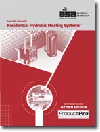'Five Key Trends'
Jim Olsztynski
Think back for a moment to the year 1988. What are some of the most dramatic changes that have taken place in your contracting business since then? Certainly there have been advances in materials, tools and equipment that have enhanced your productivity. (Contractors who didn't get more productive most likely are no longer around.) Advances in computer and communications technology, plus the Internet, no doubt have impacted the way you do business now compared with 16 years ago.
Not all of the changes are welcome. Maybe you're thinking that skilled labor is a lot harder to come by. You probably don't have much use for reverse auction bidding, or the myriad new government regulations that were enacted over those years. Perhaps there's a tinge of nostalgia for an era when you could actually get away from the job for a while without a cell phone constantly snapping you back to it.
Now, try to project yourself 16 years in the future and compare what mechanical contracting might be like compared with today. MCAA's Mechanical Contracting Education and Research Foundation has done just that with a study titled “Five Key Trends for the Future of the Mechanical Contracting Industry,” using the year 2020 as a target. Some of the conclusions read like science fiction:
“By 2020, nanotechnology will change the paradigm of construction from valve by valve, unit by unit, to atom by atom … The first thing built on every jobsite could be a materials factory that will produce some or all the materials needed for that particular job … The service contractor's 'technician' of the future could be a microscopic, versatile robot that can continually monitor and repair systems and materials.”
Reality Check
Whoa, let's not get carried away. This skeptic loves science fiction, but remains haunted by an article I once came across while researching industry history. It was from one of the association magazines circa mid-1950s, and foretold the coming era of nuclear-powered boilers. Homeowners would never again have to pay a fuel bill, the author mused. During that same era popular magazines were filled with articles about robots doing all our housework by the turn of the century, and how we'd all be buzzing around in miniature rocket ships.I point this out only as a reality check on the fallibility of futurists, not as a criticism of the MCERF document, which offers some tasty food for thought. Most of the trends it identifies are a logical extension of processes and technologies underway today. Yet, we all are so wrapped up in getting today's job done, almost nobody has the time or inclination to think about what it might mean for our business in the extended but somewhat foreseeable future. Here are some of the insights contained in the “Five Key Trends” study:
- “Children born between 1980-2000 comprise ... the Millennial Generation. Millennials have grown up in an era of high technology, group interaction (soccer, group projects at school) and racial integration/blending … and will expect to find similar qualities in their job environment. The employers and industries that embrace these values best will attract the best and brightest of the Millennials.”
- “By 2020, the distinctions among electrical, mechanical and sheet metal contractors will be tough to make … 'virtual GCs,' comprised of specialty contractors working together, will manage the majority of construction contracts.”
- “Over the next 10 years, demand for renovation and updating of 1960s-era public buildings and infrastructure will comprise a large portion of the commercial construction market.”
- “By 2015, sensor technologies built into all mechanical systems will be able to self-diagnose system problems, forewarn of potential failures, and in some cases fix the problem. As a result, by 2015, the majority of mechanical systems servicing work will be scheduled preventive maintenance - there will be increasingly fewer unforeseen system problems or emergencies.”
- “By 2010, all parts and components used in mechanical systems will have integrated RFIDs, revolutionizing inventory management and the ordering process (i.e., the supply chain) … the specialty contractor who masters the skills of coordination and communications among sensor-enabled 'smart' systems and people will be the first among equals of the specialty contractors.”
The MCERF study says that, as always, it will be those who are the most progressive in adopting the best in new technologies and human resources. Stay ahead of those curves, and you'll do fine.
Looking for a reprint of this article?
From high-res PDFs to custom plaques, order your copy today!







